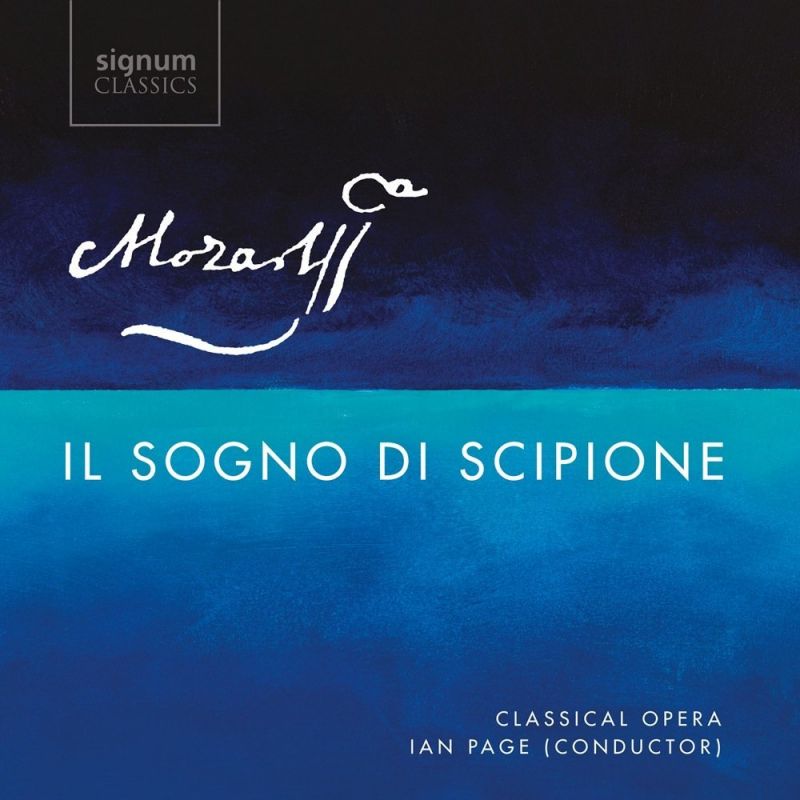MOZART Il sogno di Scipione
View record and artist detailsRecord and Artist Details
Composer or Director: Wolfgang Amadeus Mozart
Genre:
Opera
Label: Signum
Magazine Review Date: 10/2017
Media Format: CD or Download
Media Runtime: 108
Mastering:
DDD
Catalogue Number: SIGCD499

Tracks:
| Composition | Artist Credit |
|---|---|
| (Il) sogno di Scipione, 'Scipio's dream' |
Wolfgang Amadeus Mozart, Composer
Chiara Skerath, Licenza, Soprano Classical Opera Company Ian Page, Conductor Klara Ek, Costanza, Soprano Krystian Adam, Publio, Tenor Orchestra of Classical Opera Robert Murray, Emilio, Tenor Soraya Mafi, Fortuna, Soprano Stuart Jackson, Scipione, Tenor Wolfgang Amadeus Mozart, Composer |
Author: Richard Lawrence
The libretto was an old one by Metastasio, first set in 1735, whose sources were Cicero and Silius Italicus. In a dream, Scipio Africanus the Younger is visited by Fortune and Constancy, who require him to choose between them. He finds himself in the heavens, where he meets his father Emilio and his adoptive father Publio. He would like to remain with them but that is not allowed, as he still has great deeds to accomplish. Publio and Emilio refuse to advise him. In the end, Scipio plumps for Constancy; Fortune threatens him with disaster, but he awakes safely back on Earth. In the closing ‘Licenza’ a singer sycophantically addresses the archbishop: the subject is not Scipio but Hieronymus himself.
Metastasio’s libretto includes several of his trademark metaphor arias. Mozart’s setting – a string of recitatives and arias, with one accompanied recitative near the end – is leisurely, with long orchestral introductions and florid vocal writing. The exception, Publio’s ‘Quercia annosa’, provides telling relief; but, to be fair, the 15-year-old Mozart showed good dramatic sense by abridging the da capo repeats.
The Orchestra of Classical Opera, playing on period instruments about a semitone below today’s pitch, are quite wonderful: a special bouquet to Gavin Edwards and Nick Benz, whose B flat alto horns take them into the stratosphere. The singers, most of them new to me, are just as fine. Stuart Jackson manages the melismas and wide leaps of his two arias with confidence and elegance; his fellow tenors, Krystian Adam and Robert Murray, likewise display an exemplary stylishness. Constancy’s first aria and Fortune’s second are bland and pretty well interchangeable: Soraya Mafi gets more out of Fortune’s vigorous ‘Lieve sono’, while Klara Ek seals Constancy’s triumph with a brilliant account of ‘Bianchieggia in mar lo scoglio’, the kind of heroic aria that da Ponte parodied in Così fan tutte. Mozart wrote two versions of the ‘Licenza’ aria: Chiara Skerath sings them both, beautifully.
Ian Page presides over a charming performance, with well-paced recitatives and appropriate, sometimes extravagant decoration. This is minor Mozart, done supremely well.
Discover the world's largest classical music catalogue with Presto Music.

Gramophone Digital Club
- Digital Edition
- Digital Archive
- Reviews Database
- Full website access
From £8.75 / month
Subscribe
Gramophone Full Club
- Print Edition
- Digital Edition
- Digital Archive
- Reviews Database
- Full website access
From £11.00 / month
Subscribe
If you are a library, university or other organisation that would be interested in an institutional subscription to Gramophone please click here for further information.




